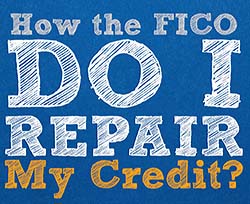Improving your FICO® credit score is a gradual process that demands patience and diligent financial management. These scores are a crucial measure of your creditworthiness, playing a significant role in determining the terms of loans, mortgages, and credit cards you can secure. They are based on an analysis of your credit payment patterns over a period, giving more weight to recent financial behaviors compared to older ones.
FICO scores provide lenders with insights into your financial responsibility and reliability. Higher scores signify a lower credit risk and can result in favorable interest rates and better loan terms. However, achieving a desirable FICO score requires a consistent history of responsible borrowing and payments.
Tips to Improve Your FICO Credit Score:
Below are some general tips to follow that may increase your FICO credit score:
1. Monitor and Address Negative Factors:
- Regularly check the negative factors listed with your FICO score to understand key areas for improvement.
- Address these areas diligently to enhance your credit standing.
2. Smart Management of New Accounts:
- Avoid opening unnecessary accounts: Opening new accounts for the sole purpose of improving your credit profile is not advisable.
- Open new credit accounts responsibly when needed and maintain a positive payment history.
3. Maintain Low Balances on Revolving Credit:
- Strive to keep balances low: High outstanding credit card debt can negatively impact your FICO score.
- Manage revolving credit responsibly to maintain a favorable credit utilization ratio.
4. Prioritize Debt Repayment:
- Focus on debt payoff: Instead of shifting debt between credit cards, work on paying down your total revolving debt.
- Prioritize paying off debt to see a positive impact on your FICO score.
5. Timely Bill Payments:
- Prompt bill payments: Make sure to pay all your bills on time to maintain a good credit record.
- Avoid delinquencies and collections to prevent a major negative impact on your FICO score.
6. Optimize Credit Card Usage:
- Responsible credit card management: Utilize your credit cards within the recommended credit limit to showcase responsible financial behavior.
- Regular, timely payments on credit cards contribute positively to your FICO score.
7. Strategic Loan Rate Shopping:
- Plan your loan rate shopping: If you're looking for a loan, do your rate comparisons within a focused timeframe to minimize negative impacts on your FICO score.
8. Strategic Account Management:
- Avoid unnecessary account closures: Closing unused credit cards without a clear reason can potentially harm your FICO score.
- Maintain a healthy credit mix and usage to demonstrate responsible financial behavior.
9. Seek Professional Guidance if Needed:
- Consult a credit counselor: If you're facing financial difficulties, consider seeking assistance from a legitimate credit counseling service to improve your financial management.
- Focus on managing your credit responsibly to enhance your FICO score over time.
10. Rebuild Credit History:
- Establish new credit accounts: Responsibly open new accounts to rebuild your credit history and showcase positive financial behavior.
- Ensure timely payments on these new accounts to demonstrate creditworthiness.
11. Maintain a Long-Term Focus:
- Understand the impact of time: Past credit issues have less influence on your FICO score as they age, and recent good payment history matters more.
- Consistent, on-time payments over an extended period will gradually improve your credit profile.
12. Practice Informed Loan Shopping:
- Consolidate loan inquiries: When shopping for loans, do so within a concentrated period to minimize the impact on your FICO score.
- Be aware of the purpose: Understand how FICO scores differentiate between loan searches to manage your applications wisely.
13. Maintain a Balanced Credit Mix:
- Diversify your credit portfolio: Having a mix of credit types, including credit cards and installment loans, can positively influence your FICO score.
- Showcase responsible credit management across various credit accounts.
14. Regular Credit Monitoring:
- Monitor your credit report: Regularly check your credit report for any inaccuracies or discrepancies that may be affecting your FICO score.
- Address errors promptly to ensure an accurate representation of your credit history.
Reasons to Improve Your FICO Credit Score:
Improving your FICO credit score is essential for several compelling reasons:
1. Better Interest Rates:
Having a higher FICO score allows you to qualify for lower interest rates on loans and credit cards. This results in substantial savings over the life of the loan or when carrying a credit card balance.
2. Easier Loan Approval:
A high FICO score increases your chances of getting approved for loans, including mortgages, auto loans, and personal loans. Lenders view a higher score as an indicator of lower risk.
3. Access to More Credit Options:
A good credit score broadens your access to a variety of credit products, providing more options to manage your finances effectively and choose credit that suits your needs.
4. Lower Insurance Premiums:
Insurance companies often use your FICO score to determine your insurance premiums. A higher score can lead to lower premiums, saving you money on insurance policies.
5. Enhanced Rental Opportunities:
Landlords may check your credit score when considering rental applications. A good FICO score improves your chances of securing a rental property and may even lead to better rental terms.
6. Employment Opportunities:
Some employers review credit scores as part of their hiring process, especially for roles involving financial responsibilities. A higher FICO score can positively impact job prospects.
7. Financial Security and Peace of Mind:
Maintaining a good credit score provides a sense of financial security and peace of mind, knowing that you have a strong credit foundation to support your future financial goals and endeavors.
Improving your FICO credit score is a proactive step toward financial well-being and stability, offering a wide array of benefits that can positively impact your financial life.

 What is a FICO Score? Most credit bureau scores in the U.S. are calculated from software developed by Fair Isaac and Company. They are commonly referred to as FICO scores and include a rating based on information found in credit reports.
What is a FICO Score? Most credit bureau scores in the U.S. are calculated from software developed by Fair Isaac and Company. They are commonly referred to as FICO scores and include a rating based on information found in credit reports. Credit scores can be the deciding factor for many major transactions. Lenders use credit scores to predict future behavior based on your past—if you have a low score because your cable bill is delinquent, then a lender won't think you're a good risk.
Credit scores can be the deciding factor for many major transactions. Lenders use credit scores to predict future behavior based on your past—if you have a low score because your cable bill is delinquent, then a lender won't think you're a good risk.